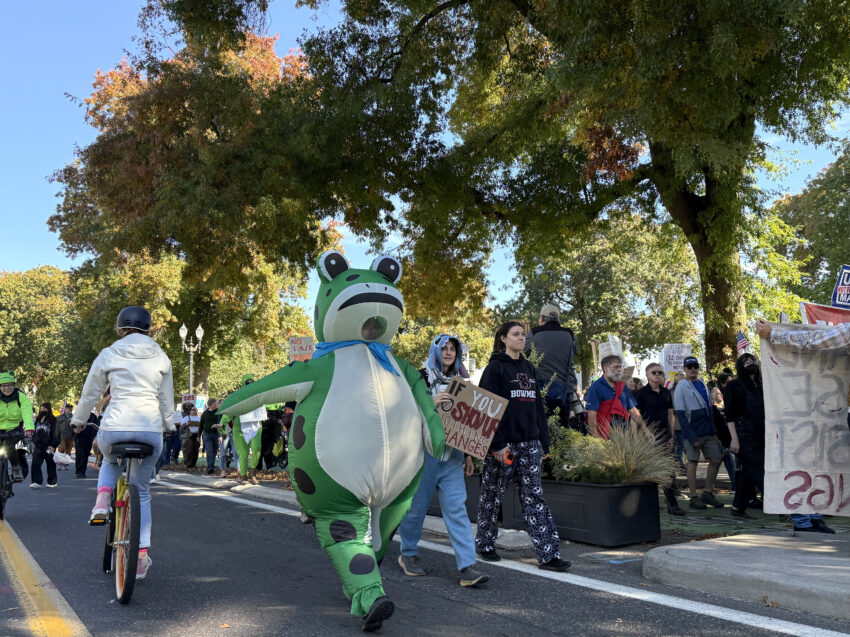
march of the frogs Thousands gathered in downtown Portland, Oregon, for a vibrant protest against the recent designation of “antifa” as a domestic terror organization.
march of the frogs
The Gathering at Waterfront Park
By the time I arrived, the waterfront park in downtown Portland was already awash with people as far as the eye could see. The No Kings protest in June had attracted around 10,000 participants across the city; however, this event saw several times that number just in the downtown area. Thousands more chose to join localized protests in their neighborhoods or in the suburbs, demonstrating a widespread discontent that transcended the boundaries of the city center.
Unable to get a precise crowd estimate, I attempted to count inflatable frog costumes—an emblematic feature of the protest. However, I gave up on this endeavor about twenty minutes later; there were simply too many frogs. The inflatable costumes, which have become a symbol of the protest movement, added a whimsical yet poignant touch to the serious undertones of the event. The frogs, often associated with the phrase “no kings,” served as a playful yet defiant statement against perceived authoritarianism.
The Context of the Protest
This protest was not merely a spontaneous gathering; it was a response to a significant political development. Last month, President Donald Trump signed an executive order designating “antifa” as a domestic terror organization. This controversial move has drawn both support and criticism, igniting debates about free speech, civil rights, and the role of government in regulating dissent. The designation has been met with alarm by many activists and civil liberties organizations, who argue that it could lead to increased surveillance and repression of legitimate protest movements.
In Portland, a city that has become a focal point for protests and counter-protests, the designation has galvanized activists. Many view it as an attempt to delegitimize their cause and silence dissenting voices. The protest at the waterfront park was a manifestation of this sentiment, as participants rallied not only against the executive order but also in support of broader issues such as racial justice, police reform, and the fight against systemic oppression.
Voices from the Crowd
The atmosphere at the protest was electric, filled with chants, music, and the sounds of drums. People of all ages and backgrounds came together, united by a common cause. As I navigated through the crowd, I spoke with several participants to gain insight into their motivations for attending.
Personal Stories
One young woman, dressed in a vibrant green frog costume, shared her perspective. “I’m here because I believe in justice and equality for everyone,” she said. “The designation of antifa as a terror group is an attack on our right to protest and speak out against injustice.” Her sentiments echoed those of many others who felt that the government’s actions were an infringement on their civil liberties.
Another participant, a middle-aged man holding a sign that read “No Kings, No Masters,” expressed his frustration with the current political climate. “This isn’t just about antifa; it’s about standing up against authoritarianism in all its forms,” he stated. “We need to show that we won’t be silenced.” His words resonated with the crowd, as many raised their fists in solidarity.
Art and Expression
The protest was also a canvas for artistic expression. Many attendees brought handmade signs, each one a unique statement reflecting personal beliefs and experiences. From powerful slogans to intricate artwork, the signs served as a visual representation of the diverse voices within the movement. One particularly striking sign read, “We are the frogs in the boiling pot,” a metaphor for the gradual erosion of civil liberties and the need for collective action before it’s too late.
Artistic performances also played a significant role in the protest. Local musicians took to makeshift stages, filling the air with songs that spoke to the struggles of marginalized communities. The combination of music, art, and activism created an atmosphere of hope and resilience, reminding participants that they were part of a larger movement for change.
Community and Solidarity
As the day progressed, the sense of community among the protesters became increasingly apparent. People shared food, water, and resources, fostering an environment of mutual support. This solidarity was particularly crucial in light of the challenges posed by the ongoing pandemic, which has made organizing large gatherings more complicated.
Local Organizations and Activism
Various local organizations set up booths at the protest, providing information about their work and how attendees could get involved. Groups focused on racial justice, environmental issues, and police reform were well represented, highlighting the interconnectedness of various social justice movements. Many activists emphasized the importance of coalition-building, recognizing that the fight against oppression takes many forms.
One organization, dedicated to supporting marginalized communities, distributed pamphlets outlining ways to engage in local activism. “We need to build bridges between different movements,” a representative explained. “Only by working together can we create lasting change.” This sentiment was echoed throughout the crowd, as participants recognized the importance of solidarity in the face of adversity.
The Broader Implications
The events in Portland are reflective of a larger national trend, as protests against systemic injustice continue to gain momentum across the United States. The designation of antifa as a domestic terror organization has sparked debates about the limits of free speech and the government’s role in regulating dissent. Many activists fear that this designation could lead to increased surveillance and repression of protest movements, particularly those that challenge the status quo.
National Reactions
Reactions to the executive order have been mixed. Supporters argue that it is necessary to combat violence and extremism, while critics warn that it could set a dangerous precedent for the criminalization of dissent. The potential for misuse of this designation raises concerns about civil liberties and the right to protest, prompting calls for greater accountability and transparency in law enforcement practices.
In Portland, the protests have become a symbol of resistance against authoritarianism and a call for greater social justice. The city has seen a surge in activism, with many residents committed to challenging systemic inequalities and advocating for change. This grassroots movement has garnered attention from national media, further amplifying the voices of those fighting for justice.
Looking Ahead
As the protest came to a close, participants began to disperse, but the energy and determination remained palpable. Many expressed their commitment to continue the fight for justice, recognizing that the struggle is far from over. The events in Portland serve as a reminder of the power of collective action and the importance of standing up against oppression.
In the coming weeks and months, it will be crucial for activists to maintain momentum and build on the solidarity demonstrated at the protest. The designation of antifa as a domestic terror organization may have sparked outrage, but it has also galvanized a movement dedicated to challenging injustice in all its forms. The fight for civil liberties, racial justice, and systemic change continues, and the voices of those who gathered at the waterfront park will undoubtedly echo in the ongoing struggle for a more equitable society.
Source: Original report
Was this helpful?
Last Modified: October 19, 2025 at 10:37 pm
2 views














